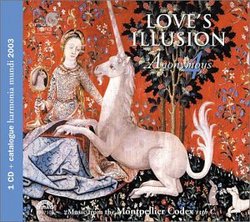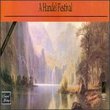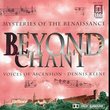| All Artists: Montpellier MS Anonymous, French Anonymous Title: Love's Illusion Members Wishing: 0 Total Copies: 0 Label: Harmonia Mundi Fr. Release Date: 5/13/2003 Album Type: Import, Limited Edition Genres: Pop, Classical Styles: Vocal Pop, Opera & Classical Vocal, Historical Periods, Early Music Number of Discs: 1 SwapaCD Credits: 1 UPCs: 093046610920, 009304661092 |
Search - Montpellier MS Anonymous, French Anonymous :: Love's Illusion
CD DetailsSimilarly Requested CDs
|
CD ReviewsNo Illusions About This Breathtaking CD Maria Alexander | Los Angeles, CA | 11/14/2006 (5 out of 5 stars) "First I should say that the content of this Limited Edition CD seems to not vary in any way from the much more expensive, regular version. Regardless of whatever differences there might be between the two, this one is extraordinarily beautiful -- quite possibly the most beautiful thing I've ever heard. Four incredible female vocalists sing these haunting motets from the 13th century Montpellier Codex, a series of French medieval love songs. These are not those irritating could-be-spiritual-or-profane ditties, but music about true romantic devotion and disillusionment. The CD includes an entire booklet of the lyrics for each motet first in the original medieval French, then translated into English. This is almost impossible to find anywhere or else I would have purchased the music directly on iTunes, as I was dying to have them as soon as possible. I cannot recommend this CD more highly." Love from the Virgin to Marion via serving a courtly lady Jacques COULARDEAU | OLLIERGUES France | 11/27/2007 (5 out of 5 stars) "These motets from the 13th century Montpellier Codex are in local language, in what the libretto calls French. That's the time of the emergence of local languages in poetry, the languages of the trouvères et the troubadours. In Montpellier the dominant language was Occitan. From the very start this love for a woman is stated as emerging from the matrix of the love all Christians experience for the Holy Virgin, the mother of the Lord, who is compared to a flower. Most motets develop courtly love that is a love of service, loyalty and absolute submission to the desires of the dame or lady, necessarily extramarital since it could not aim at getting married, since the lady was already married. Yet some of these motets become sensual and even close to sexuality and the lovers can abandon themselves in some kissing and hugging. And even one of the young ladies has been locked up in a convent to protect her against the libidinous advances of a young man, advances that were totally accepted by the young lady. So we are not surprised when we come across one mention of Robin and one mention of Marion, the couple that Adam de La Halle illustrated in a great section of his composer's secular work, the very secular love of Robin for Marion, a shepherd and a shepherdess, but also of Marion for a passing knight who gave her a few nice words and a piece of ribbon. Yet between the matrix of the love for the Virgin, a flower, a lily, a rose, a violet, and the libidinous love of a man for a beautiful blue-eyed blonde, the Marion of popular folklore, the most important part is dedicated to courtly love that can - and for one sole night - only get one opportunity of physical love after the fulfillment of the mission assigned by the lady. But the music is fascinating too. The voices of these four women, one often singing solo, or even a capella, the others being some chanting continuo behind, and at times a duet of two voices that sing in parallel, one along with the other or one superimposed onto the other. That is the beginning of real polyphony. Moreover different styles are used. Some motets are dancing like people around the maypole. Others are somber and tenebrous dirges, and in between many are close to church or sacred music, in a happier, lighter and more balanced style. The interest of these motets dealing with love is in this open variety both in theme and style, both in poetical inspiration and musical composition. This courtly love then appears like the development of what Watkins and Campanile identify as the matrix of all Indo-European poetry, viz. HERO - SLAY - DRAGON, with two extensions WITH WEAPON and WITH COMPANION. Here courtly love poetry adds a beneficiary of this heroic action FOR THE LOVE OF A LADY, a beneficiary and a motivation.
Dr Jacques COULARDEAU, University Paris Dauphine, University Paris 1 Pantheon Sorbonne & University Versailles Saint Quentin en Yvelines " |










